The Rocketeer At 25: Revisiting An Underrated Comic Book Movie Classic

We already believed a man could fly, but 25 years ago this week, a film came along which reasserted that belief, taking superhero cinema to new, dizzy heights – even if not quite enough people turned out to see it at the time.
21 June 1991 saw the US theatrical release of ‘The Rocketeer,’ the story of a struggling stunt pilot (Billy Campbell) who stumbles upon a prototype rocket pack, and winds up getting a whole lot more than he bargained for when he decides to strap it on.
Produced by Disney (under their Touchstone Pictures banner), it was an adaptation of the cult comic book by writer-artist Dave Stevens, and was the second film from director Joe Johnston, who had previously made ‘Honey, I Shrunk The Kids,’ and would go on to helm ‘Jumanji,’ ‘Jurassic Park III’ and ‘The Wolf Man.’
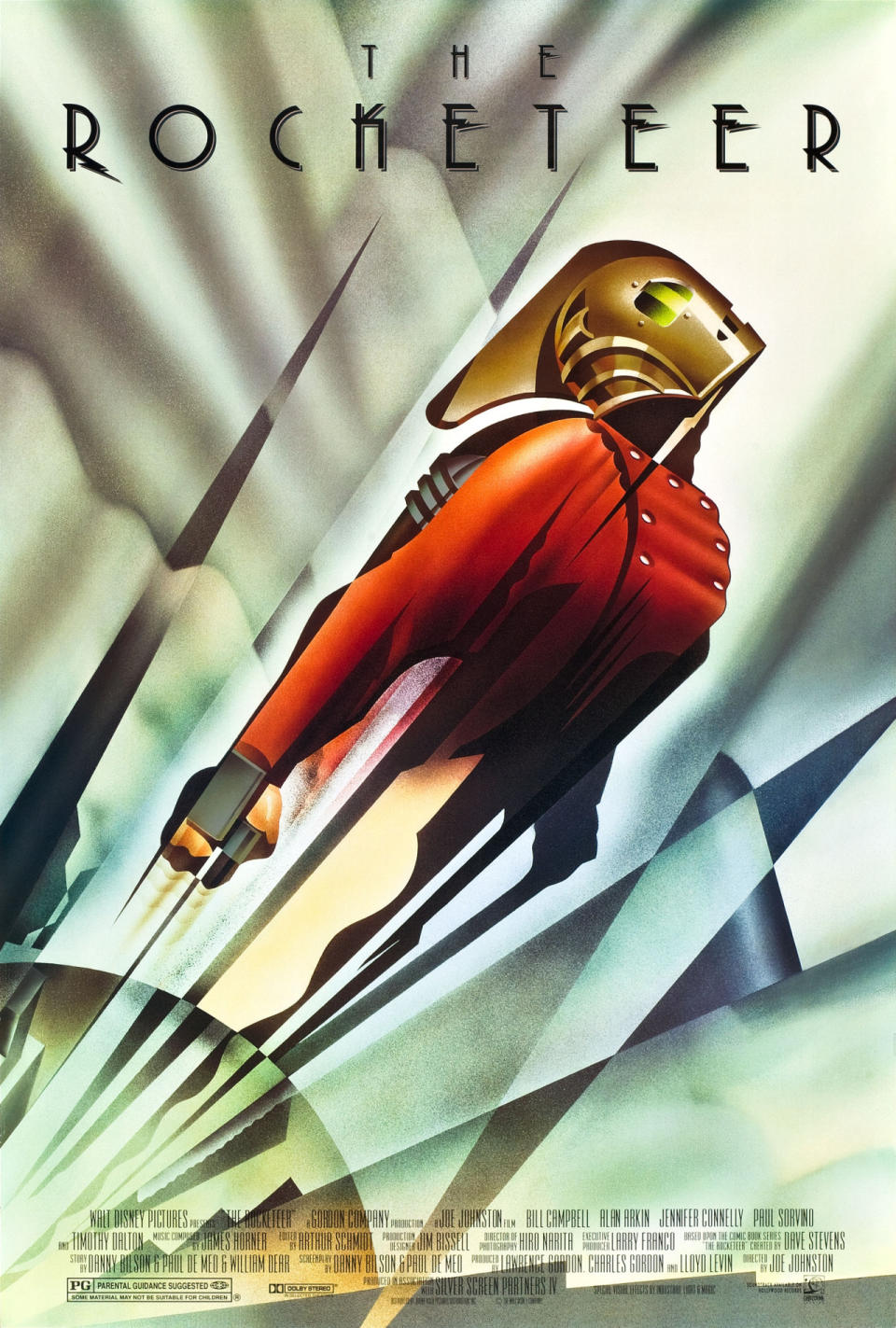
Johnston has notably returned to comic book fare in more recent years, directing 2011’s ‘Captain America: The First Avenger’ for Marvel – and there can be little question in anyone’s mind that ‘The Rocketeer’ was his main calling card for that particular job. After all, it’s a period adventure set in 1938, and centres on an All-American good guy who does battle with a villainous Nazi.
But ‘The Rocketeer’ is so much more than just a dry run for ‘Captain America.’ While its source material is nowhere near as well-read and time-honoured, it’s a movie which is every bit as steeped in reverence for a bygone age, and arguably even more focussed on presenting an upbeat, feel-good adventure with a hugely optimistic tone.
Though it didn’t make the impact it should have on release, a quarter of a century later many fans and critics agree that it’s one of the finest comic book movies ever made.
In a curious way, ‘The Rocketeer’ works for the same reasons that ‘Deadpool’ works. The films are of course very far removed in tone and content – but both are hugely faithful to the spirit of their source material, so much so that it’s almost as if the character literally leapt off the page and onto the screen.
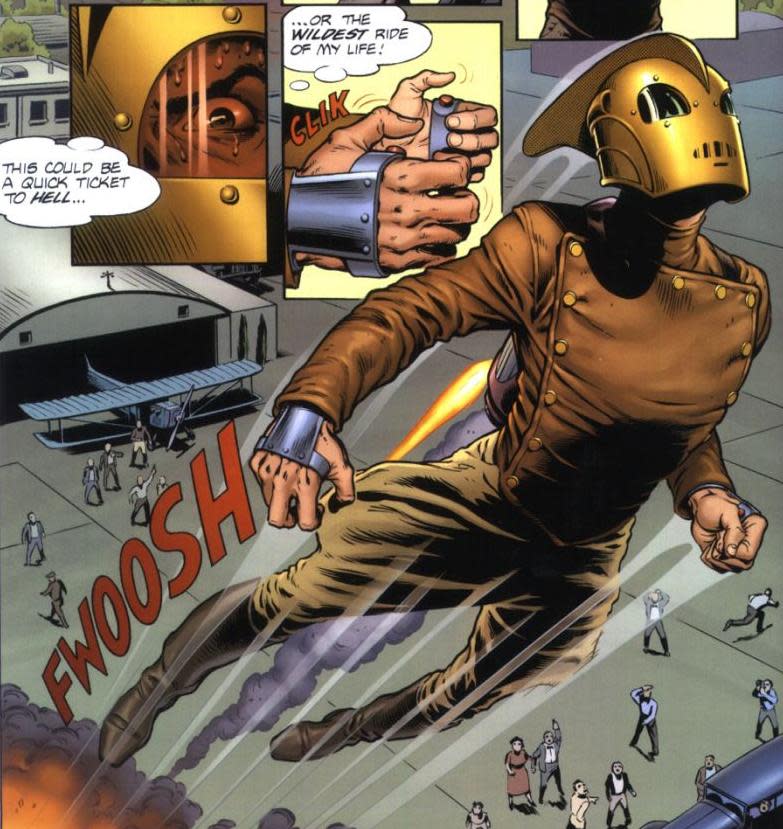
Take a look at this frame from the very first ‘Rocketeer’ comic to see what I mean. Look at the hero’s signature helmet, Cliff Secord’s tan leather jacket, the shape, the contours, the colours; the big screen version is practically identical.
On top of which, the circumstances of Secord’s first flight are also the same: the bumbling Malcolm has taken a tardy Secord’s place in an air show when his plane has engine trouble, forcing Secord to don the rocket and fly to the rescue. (Additionally, a panel from issue 2 was the direct model for the film’s art deco-inspired poster.)
This, of course, is not to suggest that Stevens’ design or concept was entirely original or groundbreaking. The writer and artist was hugely influenced by the pulp novels, comic books and adventure serial films from the 1930s to the 1950s, notably the Republic Pictures serials - ‘King of the Rocket Men,’ ‘Commando Cody: Sky Marshal of the Universe’ and others - which also featured heroes with rocket packs.
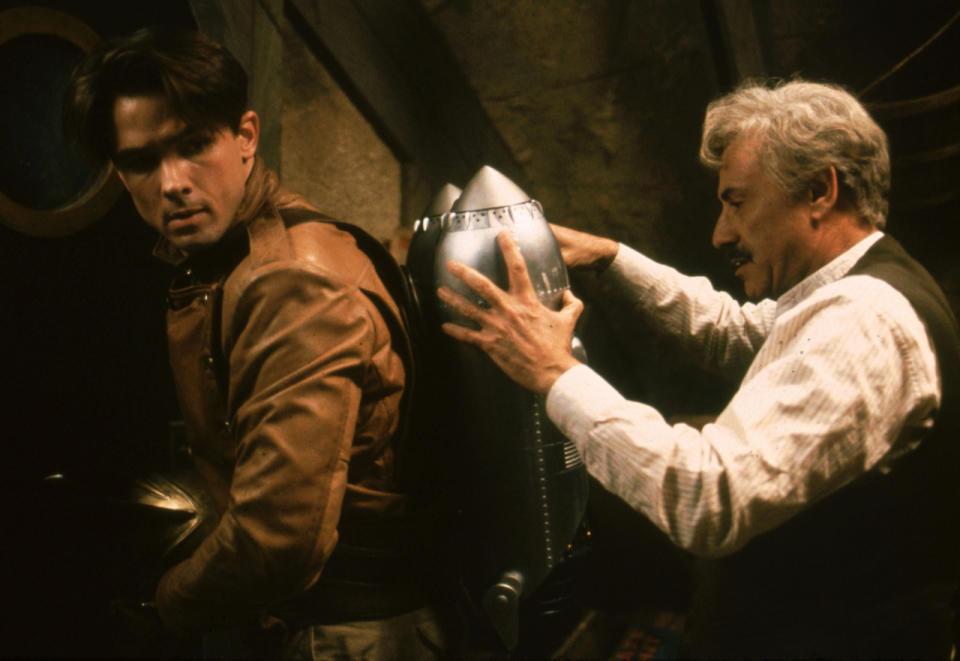
Nor is ‘The Rocketeer’ a slavish, frame-by-frame/word-for-word recreation of the comic, as, say, ‘Sin City’ would be 14 years later. Screenwriters Danny Bilson and Paul De Meo took the essentials of Stevens’ creation and built a grander, less episodic tale befitting a large scale, modern era blockbuster.
Part of making a modern blockbuster (particularly back in 1991, when the PG-13 had yet to become the rating of choice, and the UK’s 12 would not be modified to 12A for another 11 years) was ensuring the material was family-friendly. As such, one of the major differences between ‘The Rocketeer’ on screen and on the page was the character of Secord’s girlfriend.
Stevens wrote and drew her as Betty, a model whose look and personality was directly modelled on iconic 1950s pin-up Bettie Page (although the direct model for Stevens’ illustrations was reportedly his wife, 1980s cult movie scream queen Brinke Stevens).
This overt sexuality and tendency to be literally caught with her pants down was unlikely to fly in a PG movie by 1991, and so the movie reworked her into Jenny Blake, an aspiring movie actress, and cast Jennifer Connelly in one of her first adult roles.
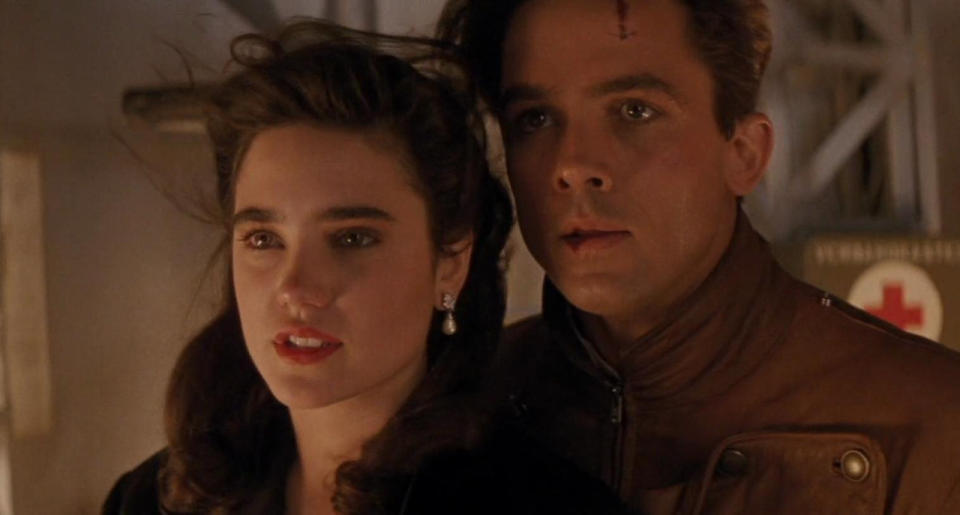
The old-fashioned movie star charisma of Connelly and Campbell is a huge part of what makes ‘The Rocketeer’ work – but as we all know, heroes are only ever as good as their villains, and Timothy Dalton’s casting as Neville Sinclair proved a masterstroke.
Coming two years after ‘Licence to Kill’ with the actor still officially James Bond at the time (he didn’t officially abdicate until 1994), ‘The Rocketeer’ stands as strong evidence that, ultimately, Dalton is far more at home playing the bad guy; for starters, he’s one of those people whose face doesn’t quite look right without a moustache.
While his wasn’t the most memorable antagonist of 1991 (‘The Rocketeer’ hit cinemas only a week after Alan Rickman stole the show in legendary fashion in ‘Robin Hood: Prince of Thieves’), Dalton clearly relishes the role of the sleazy Hollywood superstar who’s secretly a Nazi spy – although it would be another 16 years before he really hit the bad guy jackpot in ‘Hot Fuzz.’
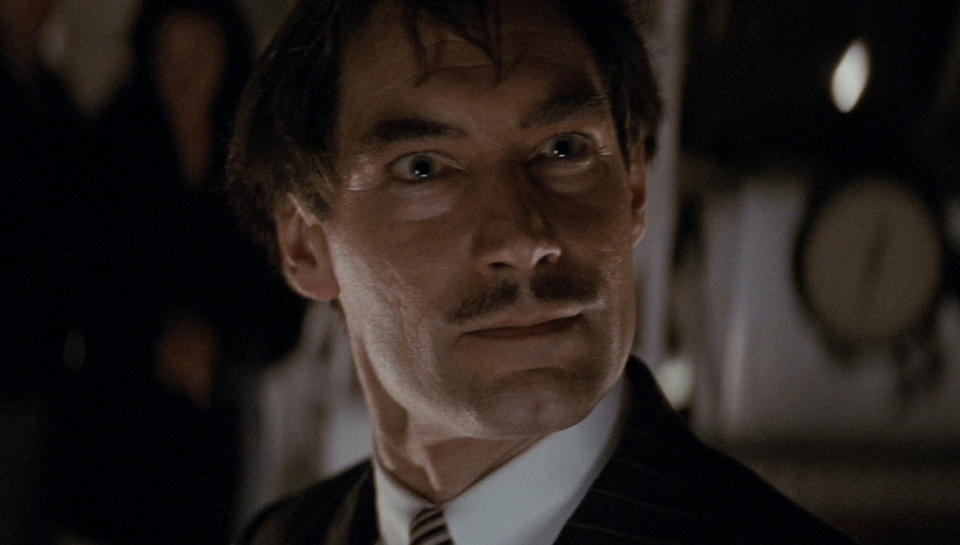
On top of this, Dalton has excellent villain support from Paul Sorvino as gangster Eddie Valentine – and, in another of the film’s masterstrokes, there turns out to be rather more to Valentine than we initially expect.
As previously stated, the optimistic viewpoint of ‘The Rocketeer’ is key to the film’s success and enduring appeal. Whilst Secord does not initially don the rocket for altruistic reasons (not unlike the origins of Spider-Man, he figures it can make him some money), and he isn’t necessarily that good at being a hero at first, but when trouble arise he never shies away from doing the right thing.
This sense of serving a greater good proves infectious, as by the final reels Valentine’s gang ally themselves with the FBI against Sinclair’s Nazi soldiers; and in one endearing moment, Valentine and a Fed exchange a bemused look as they stand side-by-side opening fire on their common enemy.

Given how grim and contemplative many superhero movies have become nowadays (yes, ‘Batman V Superman,’ I’m looking in your direction), there’s something so refreshing about the simple, wide-eyed wonder of ‘The Rocketeer.’ The dream of the flying man speaks to the child in all of us, and as such it’s hard not to get caught up in these flights of fancy.
It’s a shame in some ways that the film didn’t prove profitable enough for Disney to greenlight the initially hoped-for sequel, and talk of a remake has surfaced from time to time, but either way ‘The Rocketeer’ remains a wonderful, evocative vision.
As much as it took inspiration from the superheroics of years gone by, it has most definitely helped shape the face of superhero cinema today.
Picture Credit: Disney, IDW Publishing
Read More:
Are The Jaws Sequels Really That Bad?
Ferris Bueller At 30: Hero Or Villain?
Everybody Wants Some!! & 5 More Great Coming Of Age Films


